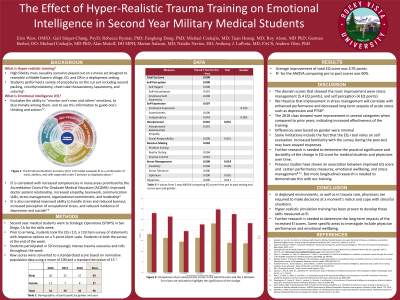General Surgery
The Effect of Hyper-Realistic Trauma Training on Emotional Intelligence in Second Year Military Medical Students

This project demonstrated that:
-Hyper-realistic trauma training increases emotional intelligence in second year medical students
-Increased emotional intelligence is correlated with improved physician wellness and less burnout
-No significance difference was seen based on gender
This project expanded upon previous exploration of emotional intelligence during the habituation for military second year medical students undergoing high-stress simulation with trauma and surgical skill training. The objective was to interpret emotional intelligence data before and after hyper-realistic immersion trauma training and to include a larger sample size than previously investigated.
Methods or Case Description: Fifty increasingly intense mass casualty scenarios with simulated Emergency Department (ED) and Operating Room (OR) procedures were performed while students lived as if deployed in an Afghan village. Students rotated through a variety of roles in both the ED and the OR throughout the weeklong program. Second year medical students completed the EQ-i 2.0 Model for Emotional Intelligence on the first and last day of the intensive surgical skills week.
Outcomes: Total emotional intelligence significantly improved from pre to post scores as well as each of the five domains and most subdomains. Scores improved an average of 4 points after only a 5-day training course.
Conclusion: Hyper-realistic trauma training significantly improves emotional intelligence in second year medical students. This has wide implications for the future of medical and surgical training. This training philosophy can develop emotionally intelligent physicians who can perform well under stress and be more resistant to burn out which is something the medical community desperately needs.
- RR
Rebecca Ryznar, PhD
Assistant Professor of Molecular Biology
RVU
Parker, CO, US - EW
